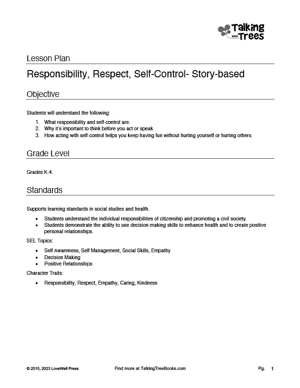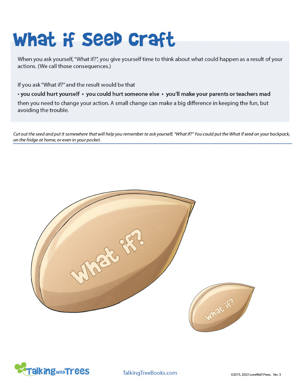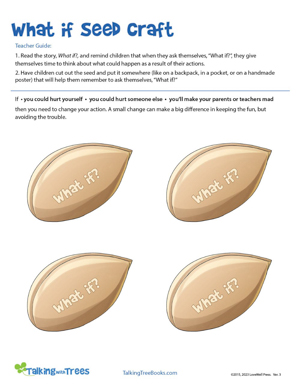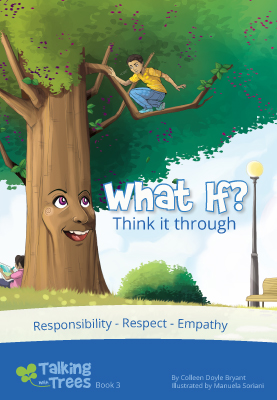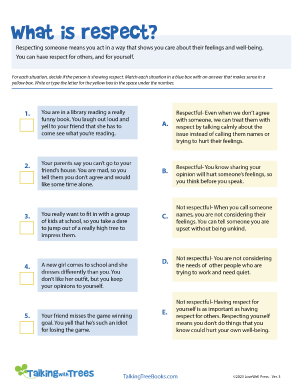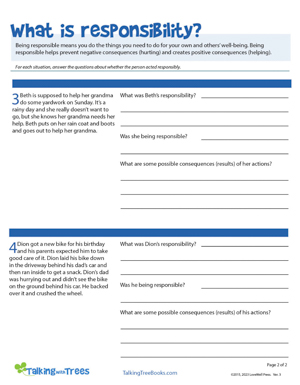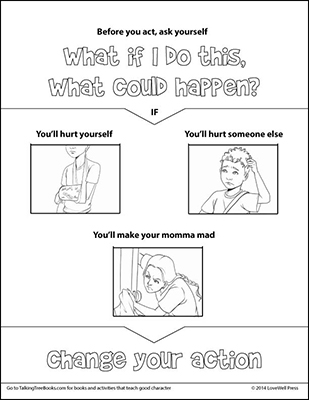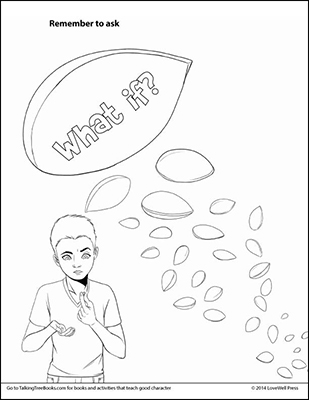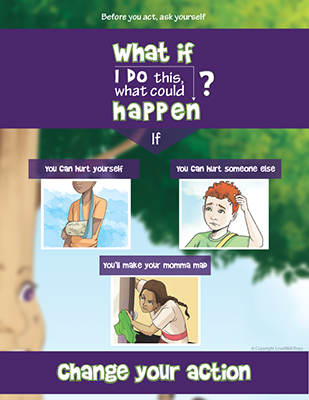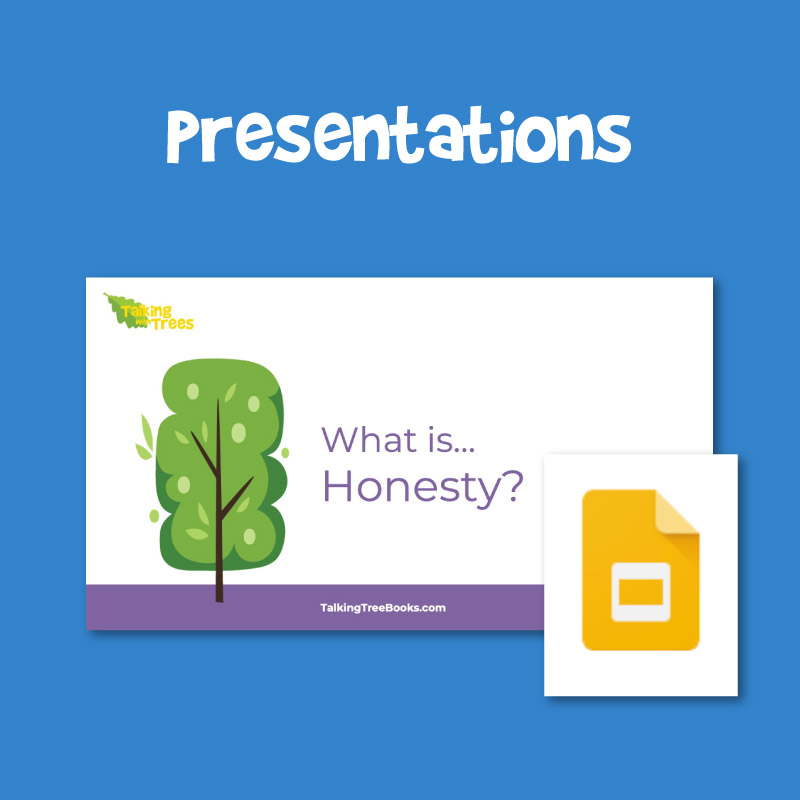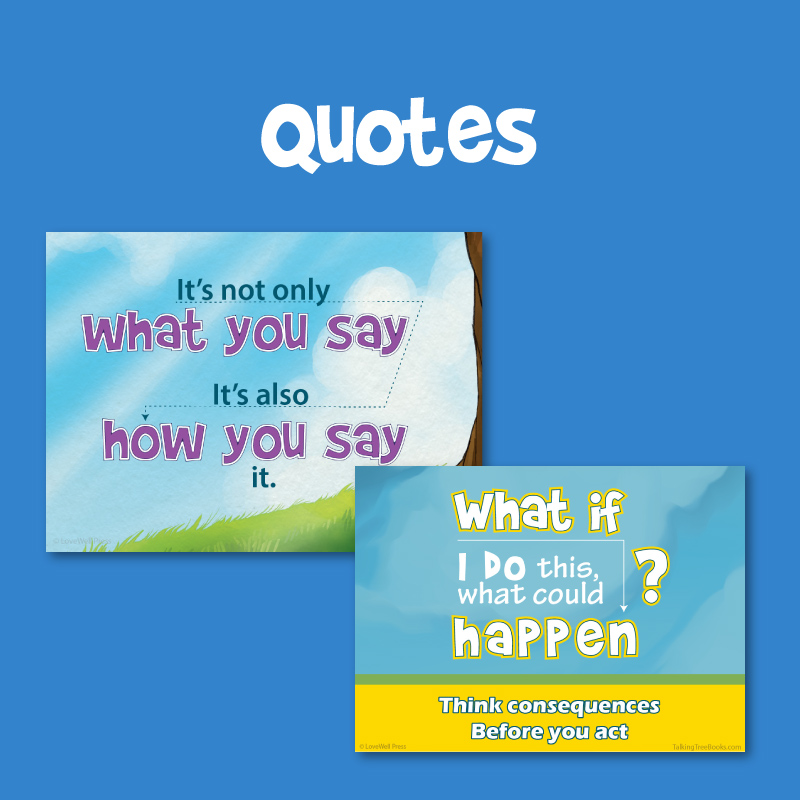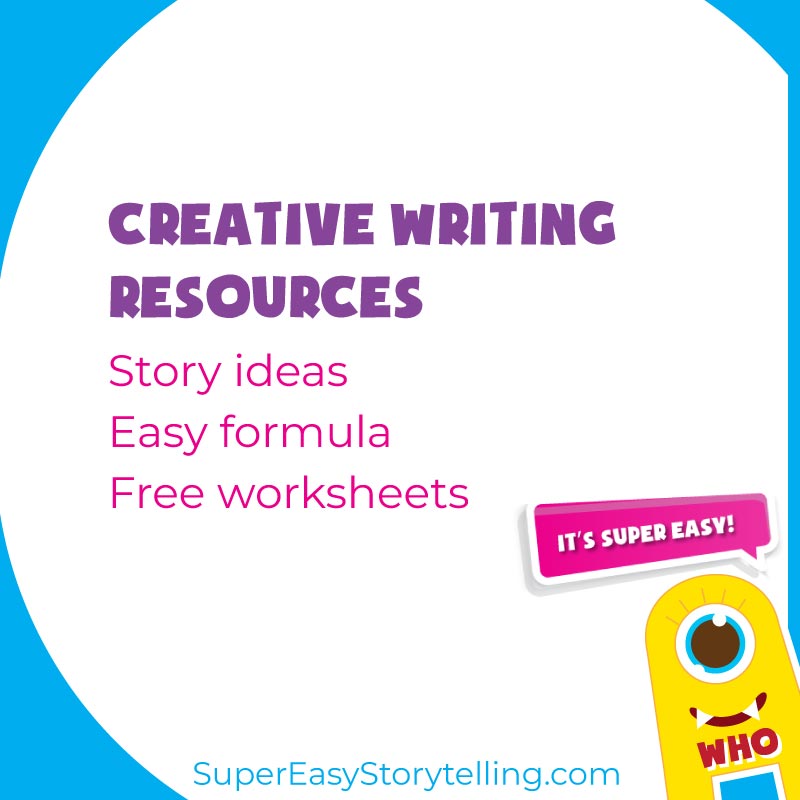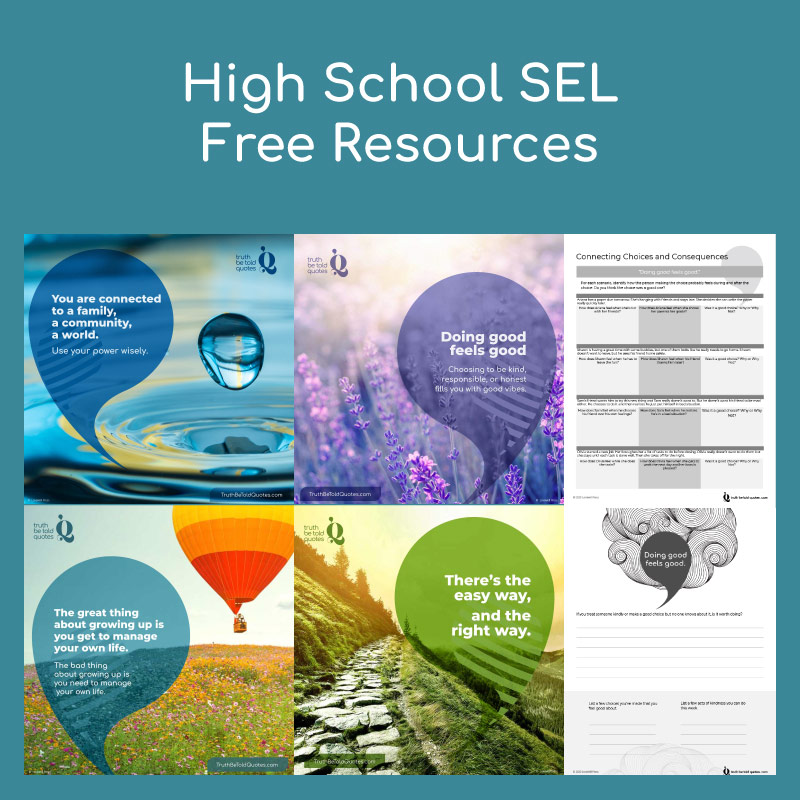What if? Lesson Plan on Respect, Responsibility
Character Ed / SEL Lesson Plan for grades K-4
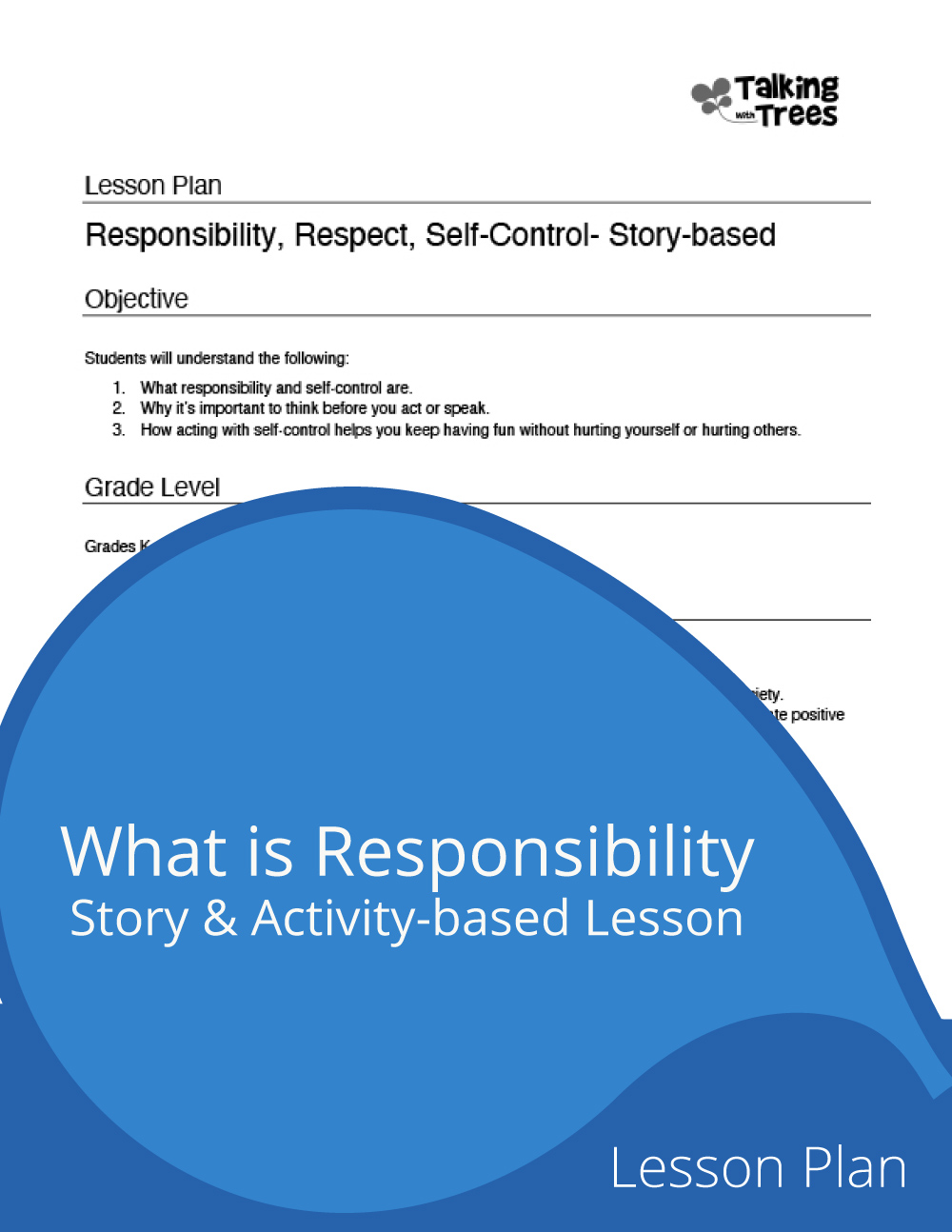
What if? Think before you act
Objective
Students will understand the following:
- What responsibility and self-control / self-management are.
- Why it’s important to think before you act or speak.
- How acting with self-control helps you keep having fun without hurting yourself or hurting others.
Grade Level
K - 4
Character / SEL Topics
- Self Awareness, Self Management, Social Skills, Empathy
- Decision Making
- Positive relationships
- Traits: Responsibility, Respect, Empathy, Caring, Kindness
Download Resources
Our PDFs are free to print or share for non-commercial use, meaning you are welcome to link to our website for educational purposes, add PDFs to your Google classroom or print PDFs for in-class use.
What if Lesson Plan Resources
Vocabulary
Responsibility- Taking responsibility or being responsible is about doing what you are supposed to do, and doing your
best job. There are things you are supposed to do, and being responsible for your actions means that you get either the
praise/reward for a job well done, or the blame for a job done poorly or not at all. Responsibility is about how your
actions cause positive or negative results (consequences.) Responsibility includes:
• A responsibility is something you are supposed to do. It can be a task, like feeding the dog. Or it can be a way of
behaving, like raising your hand and waiting your turn to speak. We would say, “It’s your responsibility to
behave in class and to feed the dog.”
• Being responsible (or acting responsibly) means you do the things you are supposed to do, which leads to
positive results. Being irresponsible, means you don’t do what you are supposed to do, which leads to negative
results (consequences.)
Respect- Respect means you treat people in a way that shows you care about their feelings and well-being.
Self-Control / Self Management- Self control or self management means you are aware of how you are behaving / what you are doing, and you change your
actions to fit what you know is the right way to behave.
Procedures
Read What if? children’s book
Read the printed book or project, share ebook, or project the ebook on a whiteboard.
Be aware of your actions
We see several situations where children were caught up in what they were doing and didn’t think about how their actions would have an impact on themselves or other people. Ask the children for examples from the book in which a child didn’t think before he/she acted or spoke.
- The boy was ready to jump from a branch that was too high and he could have been seriously hurt.
- The boy thought he was being funny when he criticized his friend’s haircut, but the friend’s feelings were hurt. (To encourage empathy, show children the facial expressions on the boy and his friend and ask how each is feeling.)
- The sister teased her brother about losing his friend. (Compare the picture of how the boy felt when he was teasing his friend with how he felt when his sister was teasing him. Use this to demonstrate empathy and how the boy could think of his own experience being teased to help him remember not to tease others.)
- The mother was so happy and excited about her berries that she didn’t think of how her mom would not be happy about the mess on the floor.
Changing your behavior
Ask the children why it’s helpful to ask “What if?” before they act
- It helps you pause before you act or speak so you can consider the consequences.
- It gives you the time to adjust your actions and make a better choice.
Tie “What if?” to responsibility and self-control
- Asking “What if?” helps you remember to be responsible for your actions. Responsibility is about doing what you need to do for a positive outcome, even when there is an easier or more fun option. “What if?” helps you remember that your actions have consequences.
- Being aware of how your actions have an impact, and changing your behavior is also called having self-control. When you can use self-control in lots of situations, then parents and teachers know they can trust you to make good choices.
- Asking “What if?” can help with impulse control (“But I really want to right now!”) because you think about consequences and whether it’s worth the trouble that could come if you give in to the temptation.
What are some guidelines that tell you that you should change your actions?
- You can seriously hurt yourself
- You can hurt someone else
- Your mom/dad/teacher will be upset
Does asking “What if?” mean you can’t do anything fun?
Thinking before you act or speak helps you see more options—different ways of acting that lead to a better outcome. For examples:
- The tree said she was great for climbing, so she was encouraging the boy to climb. Asking “What if?” helped the boy realize he should climb a little lower before he jumped. The change of action kept him from getting hurt so he could climb again another day.
- The boy didn’t like his friend’s haircut and said something so insulting, his friend stopped speaking to him. “What if?” could have helped him tell his friend in a more polite way that he didn’t like the haircut. Treating others with respect means you care enough to think about their feelings and well-being before you act. Asking “What if?” would have helped the boy to be more respectful.
- The sister teased her brother right after criticizing her brother for the same behavior. Had she asked “What if?” she could have made her point in a kinder, more respectful way.
- The mother was very happy and excited, but that changed quickly when her mother was upset and had her help clean the floor. “What if?” could have shown the girl to wipe her feet and clean her clothes so she could have remained happy and could have enjoyed her berries with her mom.
Practice with some examples
Use the “What would you do” page near the end of the book to talk through some more examples. Ask the children how they could change their behavior to keep having fun, without the trouble.
- Your ball rolls into the street. You want to run out and grab it before it rolls down the street. (What if I run in the street? Are there cars coming? Is it safe? I’d better stop and check before I go into the street, even if that means the ball is harder to catch up with.)
- Your classmate makes a mistake writing on the whiteboard, and you think of something really funny to say about it. (What if I say this now? Is it funny-nice or funny-mean? Will it disrupt the class? Will my teacher be upset? Maybe I should wait to say it to my friend in private later, or not say it at all.)
- You are supposed to finish your homework before you go out and play. You only have a few math problems left to do, but your friend is ready to play now. (What if I stop doing my homework and play now? Maybe I should ask my friend to wait a minute while I finish. Maybe I can ask my parent if I can finish the last few problems later.)
- You are waiting in line at the grocery store with your parents and it’s so boring. You look at your brother and think it would be fun to poke him in the stomach. (What if I poke my brother? He might get upset, he might poke me back, we might end up arguing… Maybe I should find something else to do to keep my busy, like play I Spy, or see how many different colored bubble gums are on the rack, or…)
Discuss why responsibility and self-control are important to society
Being responsible means you do the things you are supposed to do, both actions and behaviors, so there is a positive outcome. In a classroom, in a family, in a society—everyone has responsibilities, or jobs to do, that keep things running smoothly.
What would happen if people weren’t responsible? What if they didn’t think about the consequences of their actions? (e.g. your parents didn’t feel like working anymore; the garbage men stopped picking up the trash; policemen didn’t care about keeping people safe; you don’t bother to study in school or brush your teeth or feed the dog)
Supporting Activities
Make a “What if” seed- Print a “What if” Seed free worksheet. Have children cut out and color the seed. Hang from a backpack, make a poster, or paste to cardboard and keep it in a pocket.

